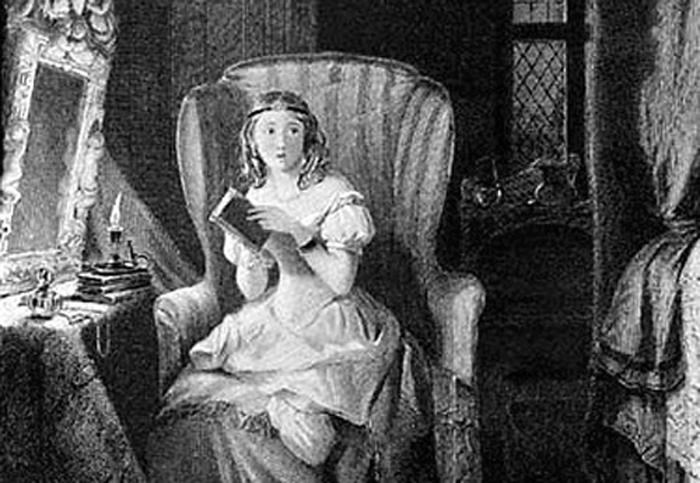Northanger Abbey, by Jane Austen, is perhaps one of her lesser-known works, but I think it is indubitably her best. A quintessential draw to Austen’s heroines is their wit, intelligence, and confidence. Catherine Morland shows another dimension to Austen’s genius in her sheerly artless simplicity and earnest demeanor, which shapes her as a person, and lands her in some humorous consequences due to her abundant imagination.
Despite her naivety, her sincerity and keen sense of doing what she thinks is right shapes her feminist character of resolute action, and as she grows up throughout the novel and her naivety is checked, her youthful spirit remains. Austen not only created one of her most loveable characters, but also one of her most dynamic. Catherine is a tomboy in childhood, and entirely dislikes educational books, until she comes to adore novels ─ Gothic novels, no less. Humorously, when she is recommended a stream of such novels she is quick to say, “but are they all horrid, are you sure they are all horrid?”
Catherine later gets on famously with Eleanor and Henry Tilney but quickly realises she cannot always keep up in their conversation of various artistic techniques and other things she has no notion of. Her connection with them prevails, however, and indeed becomes even closer: Austen shows this sometimes hapless heroine getting on so well with this highly esteemed family, much in the same vein as her other great novel, Emma, but in a slightly different way.
Emma esteems her friend Harriet’s good character to where she knows her dear friend ought to marry someone very deserving of her earnest kindness ─ only when looking for the married match, she suddenly remembers class (in which Harriet is of low standing), and ends up excitedly trying to match Harriet to a very unpleasant man who is above her class standing. In Northanger Abbey, Austen shows how this free sincerity of Catherine makes her so very wonderful and individual. To return to Emma, there is a quote that illustrates this perfectly saying, “there is no charm equal to tenderness of heart.”
Another marvellous layer to the novel is Austen’s feminist defence of the novel and arguing against the wrongful notion that both women and novels have underwhelming depth and brilliance. For, she argues, heroines are too often expected to prove their own good sense by thinking the novel is something ridiculous and not worth thinking much of at all. “Alas!” the narrator begins, “if the heroine of one novel be not patronized by the heroine of another, from whom can she expect protection and regard?”
Here, the narrator speaks of the value of a heroine, this very protection and regard, that can seemingly only be won by disliking the useless thing of a novel, but Austen shows the falsity in such a claim, for, it is in novels “which the greatest powers of the mind are displayed, in which the most thorough knowledge of human nature, the happiest delineation of it varies, the liveliest effusions of wit and humour are conveyed to the world in the best chosen language.”
Austen disproves, in all the compelling spirit of Catherine herself, headlong the notion that infantilizes the novel's splendour into something that is petty and fanciful, proving that a heroine with a novel is in fact a prime example of the depth and strength of character and vibrant thought that women possess, with the novel being their ideal companion in which they may find illustrious worlds that their keen minds may inhabit.
Yet, amidst it all is the humorous satire of the Gothic novel, through the sensational imagination it captures unsuspecting Catherine in, prompting her to realise another dimension of her own character and then grow as a person, therefore proving Austen’s defence of the novel nonetheless.
It is Catherine’s imaginative wanderings that land her in the most trouble, but despite it all, her kind nature and good spirit draw her to other people of the same character, despite standing or class. It is in the most special feature of Catherine being her earnest demeanor and humourous imagination that the brilliant feminist Austen creates something extraordinary. It is not intelligence, beauty, confounding wit (in which she humorously proclaims by saying, “I cannot speak well enough to be unintelligible.”), or anything learnt that makes Catherine who she is, it is something wholly her own, that trumps all odds and lands her in perfect happiness.
With the power of Catherine’s character lying in her artless, simple, and honest way, Austen created her best feminist heroine: in full force, without a touch of anything to give her brilliance, because she has all her incredulity entirely and wholeheartedly already within.
Throughout Northanger Abbey, Austen proves the capacity of women in thought, imagination, and spirit, despite all that Catherine’s situation may ordinarily seem to counteract her as the most suited and splendid heroine. Perhaps my favourite part of it all is how Austen starts this masterpiece with the very sentiment that grants it its splendour, for “no one who had ever seen Catherine Morland in her infancy would have supposed her born to be an heroine.”



